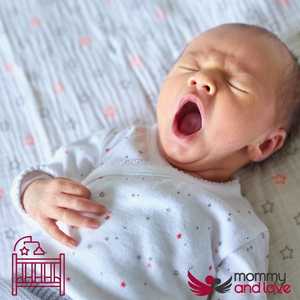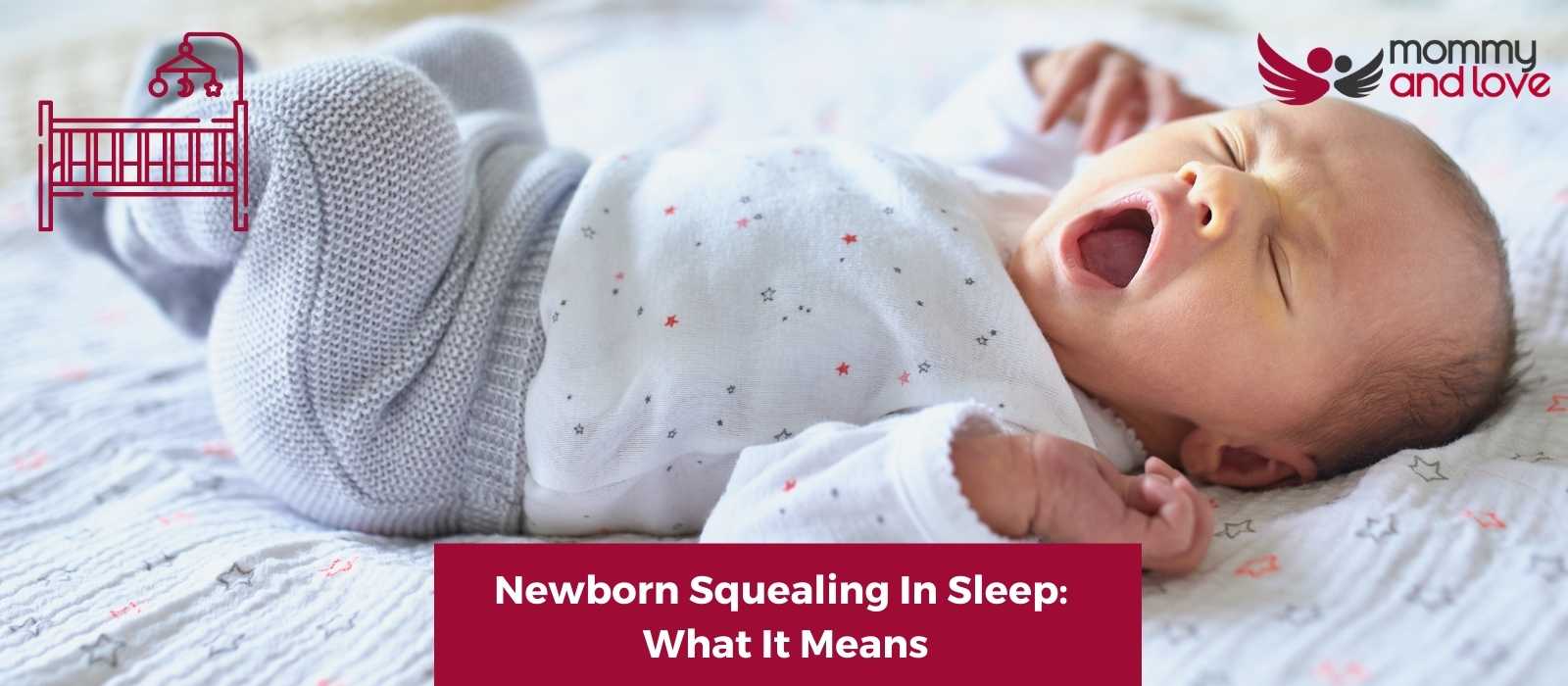Do you sometimes hear your baby making a strange noise during sleep? It might sound like they are squealing, and it can be quite alarming if you’re not used to it.
It is totally normal to hear your baby squeal, squeak, grunt, or sigh while sleeping. As your baby progresses through their sleep cycles, there will be periods of quiet, undisturbed sleep interspersed with periods of noisy sleep. All of this is considered a normal sleep pattern.
Why Is My Newborn Squealing in His Sleep?
For most babies in their first year, the noisy squeaking sound is not significant and goes away on its own.
There are several reasons why newborns make strange noises while they sleep.
- Soft tissues around the baby’s vocal cords or throat generate squeaky sounds while they breath, commonly known as stridor. This can happen weeks after birth or during one of your feeding sessions.
- Most babies’ airways are so tiny that even a trace of mucus or dry air can produce whistling, rattling, or wheezing while they sleep.
- Acid reflux or even all that milk-chugging can clog the throat and cause irregular breathing sounds.
- Your baby girl or boy might be experiencing a deep sleep where she has a dream or nightmare. These signs can happen even if your baby seems to be sleeping soundly.
- Your baby is uncomfortable and trying to move around to get more comfortable. This is especially likely if the baby’s squirming and kicking his legs while he squeals.
Is It Normal for Newborns to Squeak in Their Sleep?

It’s perfectly normal for newborns to squeak or make wheezing sounds in their sleep. In fact, this breathing pattern is one of the many adorable things they do!
If you’re a new parent, you might be wondering if your baby’s squeaking is normal. Rest assured, it is! Newborns often make all sorts of cute little noises while they’re sleeping.
You might also hear different sounds and facial expressions while your baby is asleep. For instance, you will hear them making digestive sounds which is pretty common, especially for little children that have already started eating solid foods.
Lip-smacking while asleep is also considered normal.
So, if you hear your newborn squeaking in their sleep, don’t worry. It’s just one of the many adorable things they do! Enjoy it while it lasts! Soon enough, they’ll be all grown up and won’t be making any cute little noises anymore.
If you have worried about the sounds your baby’s making while asleep, you can always talk to your doctor about it.
What Does a High-Pitched Squeal Mean From a Baby?

If your baby makes noises or if you hear new sounds while she is sleeping or breathing, take note of what they sound like.
Remember that as your baby breathes, she might make a lot of sounds. The high-pitched, squeaky sound your little one makes while sleeping is called stridor or laryngomalacia.
Many babies who have laryngomalacia don’t have trouble breathing even when they’re crying or feeding. When many babies breathe in, they make noisy breathing sounds. It’s even worse if the child is lying on their back. It is usually harmless and is caused by excess tissue around the larynx or vocal cords of the baby.
These breathing patterns usually happen in the first few weeks or few months after the birth of the baby and the noise usually passes by the time the baby reaches the age of two. You may hear louder noises if your baby is exercising, crying or have a viral infection.
Parents who are concerned about the stridor of their child should consult their baby’s pediatrician or their baby’s doctor. They can provide medical advice, diagnosis, or treatment. In some cases, it may be necessary to see an ENT (ear, nose, and throat) specialist.
If your child is having difficulty breathing or respiratory distress, is not gaining weight, or has other symptoms, treatment may be necessary.
In other words with proper treatment and continued development, parents shouldn’t worry and should expect a happy baby.
Does Laryngomalacia Cause SIDS?
Laryngomalacia is a condition that can cause noisy breathing in babies. It’s possible for laryngomalacia to increase the risk of SIDS, but most cases are not dangerous. Most infants outgrow laryngomalacia and noisy breathing, but a few cases end up needing surgery to correct the issue.
What Does a Baby With Laryngomalacia Sound Like?

It is important for parents to understand how a newborn sleep and what sounds they make.
Many parents think that a baby with Laryngomalacia sounds like they are struggling to breathe. However, this is not the case.
A baby with Laryngomalacia actually sounds like they are making a soft snoring noise when they breathe in. This is because the soft tissue in their larynx (vocal cords) is collapsing. This can make it difficult for babies to get enough air into their lungs, which can lead to problems like feeding difficulties and poor weight gain.
Conclusion
So, the next time parents hear their baby squealing while sleeping and start to panic, they should remember that it is perfectly normal. Take a deep breath, relax, and know that your baby is just going through their sleep cycles as they should. And if you ever have any questions or concerns about your baby’s sleep patterns, be sure to talk to your pediatrician or doctor. Thanks for reading!
FAQ
What Is Your Baby’s Breathing Like When She Sleeps?
When you observe your baby’s breathing, you may notice that it is different when she is asleep as opposed to when she is awake. This is because while babies sleep, their breathing may slow to 20 breaths per minute.
Additionally, a newborn’s breathing may halt for periods of time lasting from five to ten seconds, and then resume more rapidly.
When periodic breathing occurs, a newborn’s breathing rate may increase to approximately 50 to 60 breaths per minute for periods lasting from ten to fifteen seconds. However, even when resting, babies should not have more than ten seconds elapse between breaths.
When Should I Be Concerned About Baby Sleep Sounds?
If your baby is making noises during sleep that sound like grunting or rapid breathing, it’s important to talk to your pediatrician or doctor. These noises can be a sign of a serious health condition in the respiratory systems, and it’s important to get a proper diagnosis. If your baby is snoring loudly, this can also be a sign of sleep apnea, which is a serious condition that needs to be treated.
Another thing to watch out for is bluish coloration on your baby’s skin or if you see contractions in your baby’s chest or neck. If you notice any of these signs, seek immediate medical attention at your nearest emergency room.




